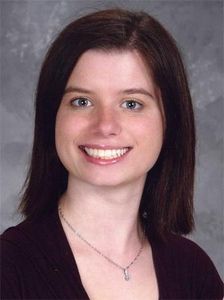BUSM Student Awarded AMA Research Grant
Kelsey Derricks, a Boston University ENGMEDIC student, was awarded a highly competitive American Medical Association (AMA) Foundation Seed Grant to conduct research in Dr. Matthew Nugent’s laboratory in the Department of Biochemistry at BUSM. Kelsey, a 2009 graduate from Boston University’s Biomedical Engineering program, will expand on her senior research project, Engineering a 3D Lung Extracellular Matrix, that she completed under the joint guidance of Dr. Nugent and Dr. Bela Suki (Department of Biomedical Engineering). Kelsey will study the mechanisms controlling lung cell production of extracellular matrix and specifically aims to understand how mechanical forces and inflammatory proteases act together to modulate the structure and function of lung extracellular matrix. The goal of these studies is to provide insight for the eventual development of new therapies for chronic obstructive pulmonary diseases, a large group of deadly diseases with few available treatment options.
 Kelsey Derricks
Kelsey Derricks
The AMA Foundation established the Seed Grant Research Program in 2000 to encourage medical students, physician residents and fellows to enter the research field. The program provides grants to help budding physician scientists conduct small basic science, applied, or clinical research projects. In 2010 the AMA Foundation awarded 38 seed grants to physicians and students across the United States. Kelsey is the first Boston University student to ever be awarded an AMA Seed Grant. Congratulations Kelsey!
The ENGMEDIC program was created in 1990 by the Department of Biomedical Engineering in the College of Engineering and the School of Medicine. It is an early selection program designed for biomedical engineering students who are interested in becoming physicians. A small number of highly qualified students, who have completed two years of the pre-medical option of the undergraduate biomedical engineering curriculum, are admitted to the program each year. The program integrates elements of pre-clinical medical training with upper division requirements for the B.S. degree in biomedical engineering, thus enabling students to fulfill some of the medical school curriculum during the last two years of undergraduate study. The program utilizes a series of instructional modules which include biochemistry, immunology, microbiology, socio-medical sciences, medical histology, human physiology, public health, humanities and social sciences.
View all posts